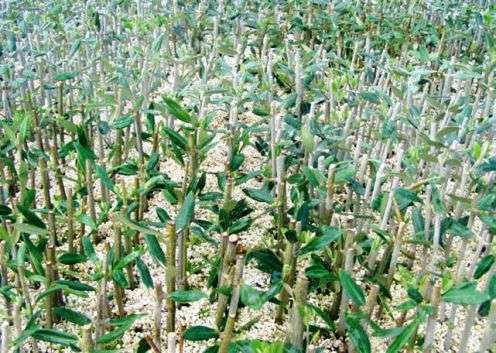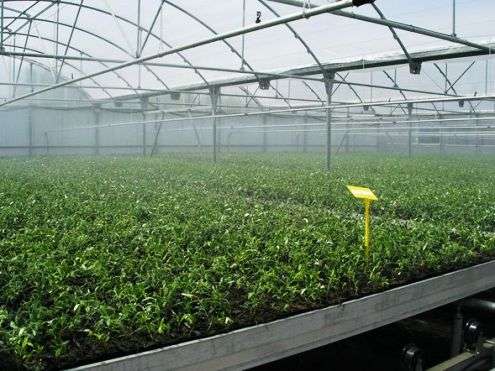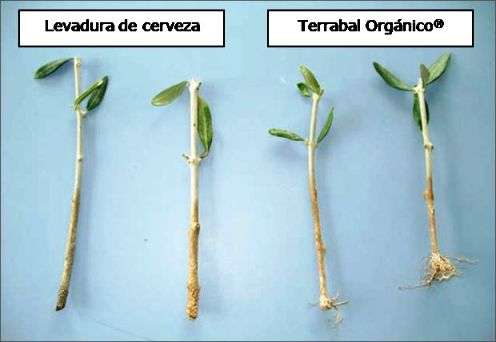Rooting olive trees for organic farming

Researchers at UPM have shown good results by using products that facilitate olive tree rooting and are authorized for organic farming.
After the enactment of organic farming regulations, there have been significant limitations to the use of certain products for rooting olive trees. Researchers from the School of Agricultural Engineering and School of Agricultural Technical Engineering of Universidad Politécnica de Madrid have taken an important step towards finding solutions thanks to the "Orgánico Terrabal" product that is permitted in organic farming and can be an alternative to the most popular rooting product for olive trees, indolebutyric acid. According to the regulation (CE) 834/2007 and 889/2008, indolebutyric acid is not permitted for organic production.
Organic farming aims to obtain the highest quality products which are respectful to the environment and can preserve soil fertility by avoiding using synthetic chemicals. Organic olive groves comprise the second-most important organic farms worldwide after coffee. Spain has more than 168,000 hectares (MAGRAMA 2012) of organic olive grove, representing 31.1 percent of the total global area. Castilla La Mancha has 38% of the organic olive grove surface in Spain. Andalucia has 33% and Extremadura 19%. It is estimated that 11.5 million kilos of organic olive oil were sold in 2012. This means an increase of about 17% compared to the year before. Italy is the main exporter of Spanish organic oil with 4 million kilos.
Today, olive tree multiplication is performed by semi-hard wood cuttings comprising stems of 20 cm with leaves (Figure 1). The base of cuttings is treated with products that facilitate the rooting and the root formation. After that, the cuttings are placed into a greenhouse on basal heated benches with filled substrate trays and are watered with intermittent misting (Figure 2) in order to maintain humidity and trigger the rooting.

Indolebutyric acid (IBA) is the most popular product in traditional agriculture to trigger the rooting of cuttings. This component belongs to the group of growth regulators. This product does not generate phytotoxic effects and it usage is relatively simple. It is essential to regulate the immersion time of cuttings. However, after the enactment of organic farming regulation (EC) No 834/2007, 889/2008, the products mentioned before are not permitted for producing organic materials.
In order to find alternatives to IBA for production of organic olive cultivars, researchers from UPM conducted two tests at the nursery of the Centro de Transferencia Tecnológica "La Isla" of the Madrid Institute for Research and Rural Development in Food (IMIDRA), located in Arganda del Rey.
Olive cuttings of 15 cm with two pairs of leaves of Cornicabra variety were prepared for the first test. Researchers performed the rooting on a basal heated bench and maintained the olive cuttings at 24 degrees and a constant humidity of around 80-90 degrees through fogging.

The cuttings were divided into several groups and each one was treated with a different product. The products tested were indolebutyric acid (to compare the effectiveness of the other products), algae extracts and yeast (that provide nutrients and have hormones), organic sunflower seeds (that when germinating produce promoting hormones for rooting) and two authorized commercial products for organic farming, Sm-6 Orgánico (seaweed extract) and Terrabal Orgánico (a nutritive product for plants from cereal extracts).
After two months, the cuttings of the basal heated benches were extracted and researchers quantified the rooting percentage. The best results were obtained with the Sm-6 Orgánico product and Terrabal Orgánico product (Figure 3). Thus, the following year they conducted the same test with only these two products and assessed the diverse dipping times of the cuttings. The best root formation was achieved with the Terrabal Orgánico product by dipping the cuttings for an hour.
This result led to the conclusion that this product could be an alternative to IBA since it can produce an organic olive plant with a similar percentage of rooting to IBA. However, dipping time of the cuttings requires regulation, because the longer the immersion, the less the percentage of rooting cuttings.
More information: Centeno Muñoz, Ana y Gómez-del-Campo, Maria (2008). "Effect of root-promoting products in the propagation of organic olive (Olea europaea L.) nursery plant." Hortscience, v. 43 (n. 7); pp.. ISSN 0018-5345.
Journal information: HortScience
Provided by Universidad Politécnica de Madrid

















